Visiting the Ghost Forest: Exploring Golden Ears Provincial Park
A Canadian wilderness lies right outside the city
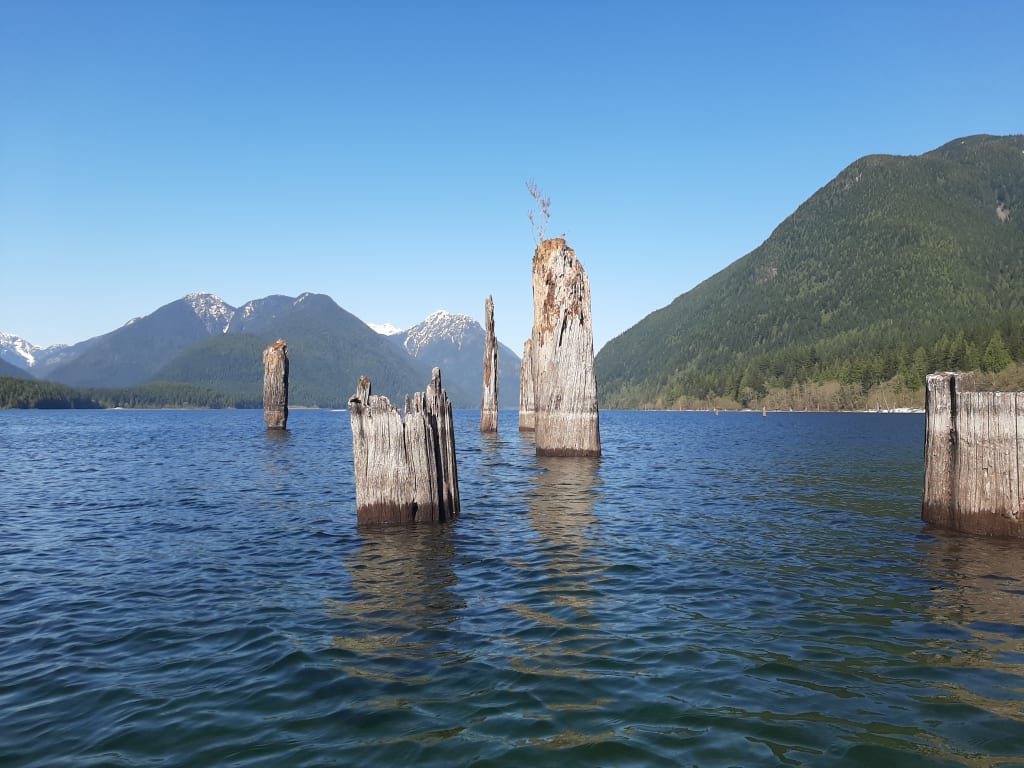
A horse splashed along the beach
There were three of them, clustered together at one end of the lake next to the hydroelectric dam. Water churned and splashed around the hooves of the white horse as it playfully kicked, stray beads leaping up to cling to the animal’s skin.
Anything this good has to be rationed. In the busy summer months, they issue passes at the park gate, turning people away when it gets too full. But it’s not summer yet. It just feels like it. On a twenty-seven-degree day in April, Golden Ears Provincial Park feels like a foreign country, a different climate, a shard of paradise snatched out of time and place like the castle that holds the Holy Grail.
But it’s not. This 555 square kilometer kingdom of mountain peaks and ancient trees is only an hour’s drive from Canada’s most densely populated city.
Alouette Lake is the center of much of the park’s recreational activity.
Flanked by stony beaches and surrounded by snow-streaked mountains, the lake is one of the most popular in the Vancouver area. When we arrived, motorboats were already humming over the rippling surface, startling crowds of geese and sending patterns of waves toward the shore.
We came prepared. I helped my wife lift her kayak off the roof of our tiny car, and together we carried it down the long path toward the water.
Children shrieked as they flung themselves into the cold lake and ran back out, shivering into the sun. A group of teenagers set up a full-sized barbecue borrowed from a parent’s backyard in the shade of the trees and tossed a football back and forth. Music drifted over the wide lawn between the parking lot and the beach, ringing out from a hundred different speakers. Pop and hip-hop and bhangra and country, all competing to claim the space between the water and the surrounding peaks.
It was a long walk. Ice-cold water washed over our feet as we reached the lake. A couple landed their own kayaks beside us as we launched, their battered hulls making a dramatic crunch and scrape as they beached themselves.
But I baby my boat. She almost never touches the ground.
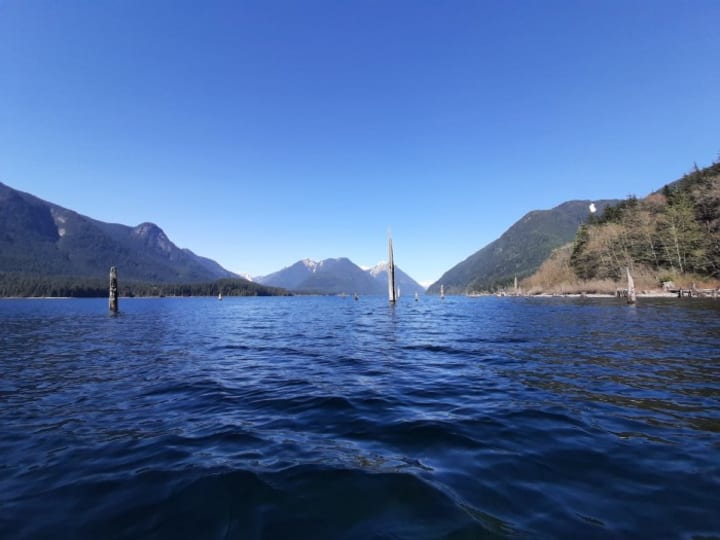
The lake seems like a natural paradise
But it’s not. Ninety-three years ago, the lake had a different name and was much smaller, a mere two kilometers in length. But in the 1920s, Vancouver was growing. Coming out of the Depression, the city was expanding rapidly, fueled by natural resources and its Pacific port. Towns were blooming like fungi in the forest, following the gold-bearing Fraser River inland from the sea.
The immigrants flooding into BC from across Canada and around the world needed both electricity and drinking water. Damming the lake provided both. And so Alouette Lake swelled into a sixteen-kilometer-long giant, harnessing the snowmelt that pours off the mountains and the rain that keeps the forests green.
But trees have value, even when dead. Before damming the lake, grizzled loggers were dispatched to the valley to harvest the trees that were about to be submerged. Thousand-year-old cedars and firs and pines fell to the ring of axes and the growl of saws. A portion of forest that grew before the dinosaurs hatched from their eggs fell and was drowned under the rising water.
In spring, the water is shallow. It might be twenty-seven degrees down in the valleys, but the melt has yet to start up on the mountains. All around the shore of the lake, you can see last summer’s high water mark, the rocks a different color like the skin under a watch strap showing where the lake reaches at its fullest.
The trees are dead, but they’re not going anywhere. Century-old notches made by dead loggers show in weathered bark where they put the springboards to saw the massive trunks down.
Because scars remain. The trees rise up when the water gets low, home to ospreys and spiders and hissing geese. Over and over again, nature teaches us that death does not exist.

The shrieking kids don’t care about the history of the lake
Nor do the stamping horses. The lake could be 100 years old or one million, and it would make no difference. The water is cold, and the sun is hot, and the forested mountains are beautiful, and that’s what draws a million visitors a year to this accessible glimpse of the wild world.
Crossing the lake above the dam, we paddled along the sunnier Eastern shore. Dead trees rose up from the water, a submerged forest towering above us, reaching for the light. We steered our kayaks between ancient trees, the shrill and rapid cry of a nesting osprey merging with the slap and suck of our paddles through the water and the gurgle of the lake rolling back from our bows.
Sometimes that’s all it takes to get away from the noise of the world. A quick trip across cold water to leave civilization behind. Like the cursed loggers and their flying canoe in the French Canadian legend of La Chasse-Galerie, we paddled through the treetops, gliding over the ghost of an ancient forest. The towering mountains watched and said nothing.
Long shadows reached toward the water
One by one, the picnic tables on the green lawn sank back into darkness. Hungry, we landed our boats back on the beach and carried them back to the car. Then we picked a table where the sun still clung on, still shining through a gap in the dark rank of trees. Last night’s leftover paella steamed and bubbled in the pot, the camp stove hissing underneath as it sent the smell of our dinner wafting over the beach.
“Smells yum,” a man said with a smile as he passed along the path that led to the water. Out in the wild, we are all better versions of ourselves. We grin and laugh and share what we have, suddenly reminded just what a frail thing human life is compared to the impersonal reality of forest and mountain.
We ate. Woodsmoke drifted over the water from the campsites situated further up the lake. Geese honked softly as they followed one another over the suddenly glassy surface. Silence came on with the encroaching evening, the blue shadows slowly claiming the beach and the lake as the sun turned away.
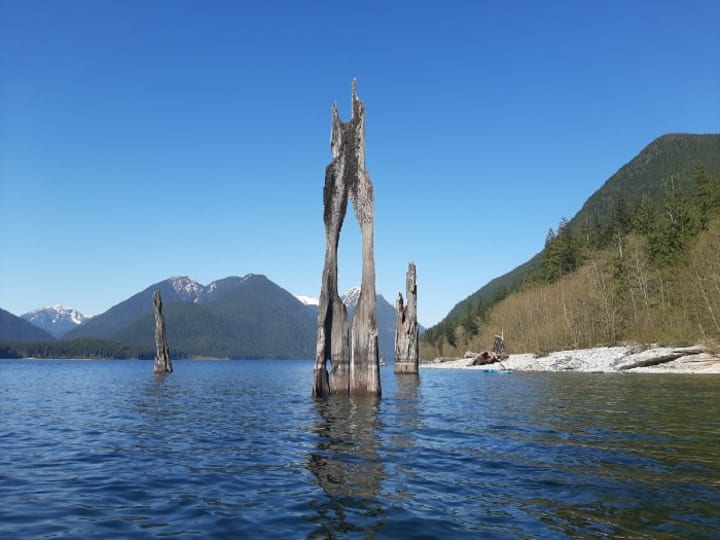
One by one, people trudged back to the car park. Engines roared into life. Headlights flared in the gloom. A long trail of ember-red taillights snaked through the trees, a river of fire heading for the highway.
It’s always better like this. These transitional times as day gives way tonight, as well-used recreation areas return to the wildness they had before any human foot reached them. But we don’t live in the forest either. A stray shiver, a sudden chill, reminded us that this is not summer, no matter what the afternoon felt like. Packing up our stove and our chairs and our snacks, we headed back to the car.
Behind us, the lake and the forest shared the silence. The ghost forest released its grip on the last of the sun. The ospreys and spiders and hissing geese tucked their heads against the night.
A million people a year come to this bright water, this ancient forest. But we leave nothing behind. When the last of us leaves for the last time, nothing will remain to show that we were ever here.
© Ryan Frawley 2021.
About the Creator
Ryan Frawley
Towers, Temples, Palaces: Essays From Europe out now!
Novelist, entomologist and cat owner. Ryan Frawley is the author of many articles and stories and one novel, Scar, available from online bookstores everywhere.

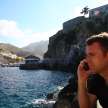
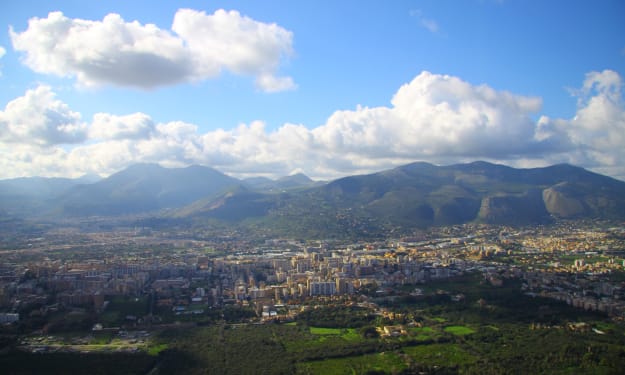

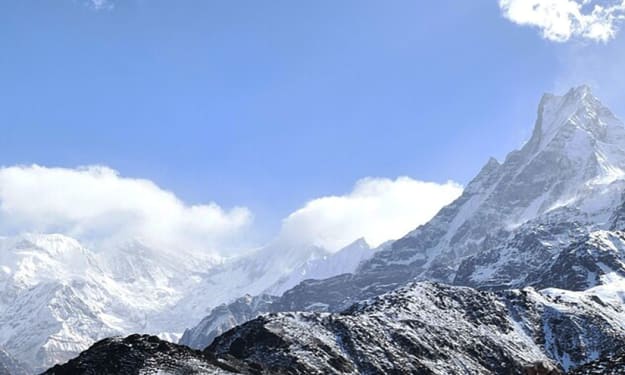

Comments
There are no comments for this story
Be the first to respond and start the conversation.